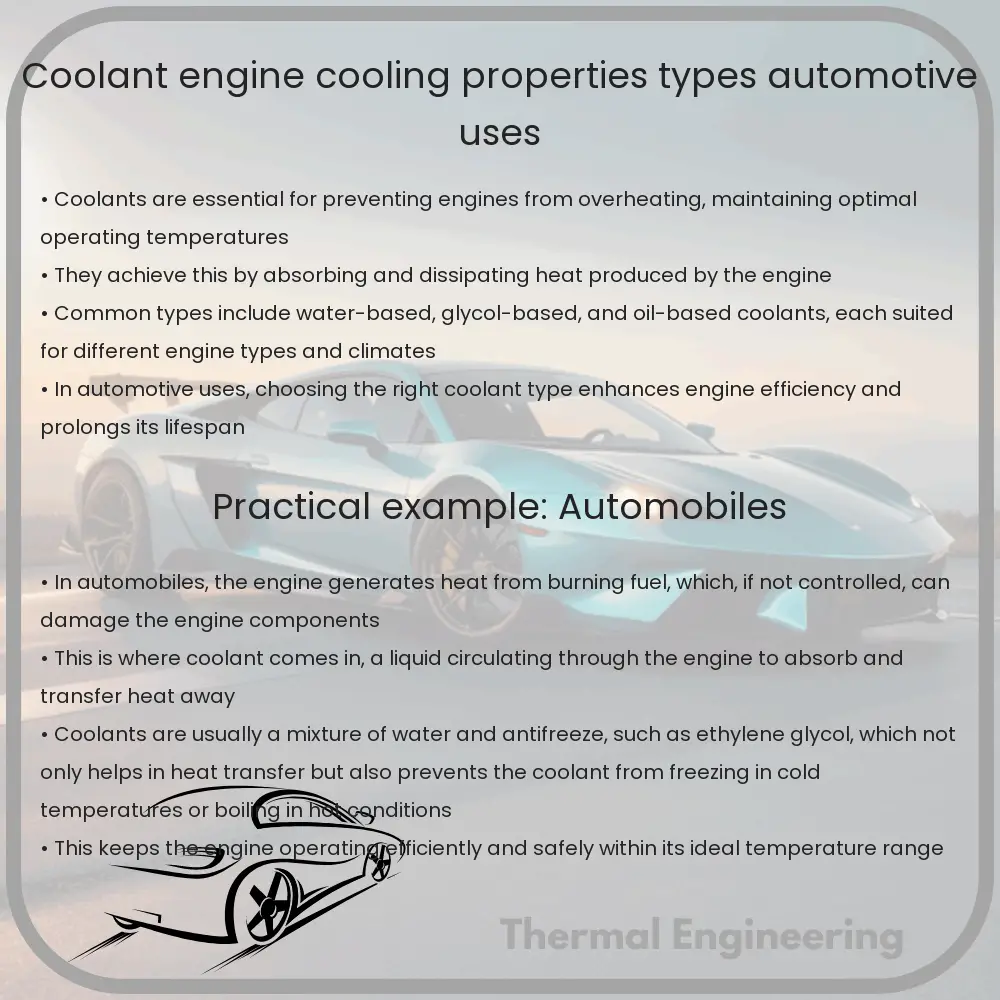Learn about coolant, a vital engine fluid that regulates temperature, prevents overheating, and shields against freezing in automotive systems.

Understanding Coolant and Its Essential Role in Engine Cooling
Coolant, also known as antifreeze, is a critical fluid used in automobiles and other machinery to maintain the engine’s temperature within optimal limits. Its primary role is to prevent overheating by transferring excess heat from the engine to the radiator, and in colder environments, it prevents the engine’s liquid components from freezing. Understanding the properties, types, and uses of coolant can help in enhancing engine efficiency and longevity.
Properties of Coolant
Coolant has several key properties that make it effective at maintaining engine temperature:
- High boiling point and low freezing point: This ensures that the coolant remains in a liquid state under a wide range of temperatures.
- Thermal conductivity: It efficiently transfers heat from the engine to the radiator.
- Non-corrosive: An ideal coolant does not corrode the engine and other components of the cooling system.
- Chemical stability: High stability to remain effective over long periods and under high temperatures.
These properties help in reducing the thermal stress on engines, extending their life and enhancing performance.
Types of Coolant
There are several types of coolant formulations available, each with different chemical compositions tailored to specific engine types and climate conditions:
- IAT (Inorganic Acid Technology): This traditional type of coolant uses silicates and phosphates to prevent corrosion and is commonly used in older vehicles.
- OAT (Organic Acid Technology): OAT coolants use organic acids that provide a longer service life and are generally silicate-free. They are popular in many modern vehicles.
- HOAT (Hybrid Organic Acid Technology): Combining the best of both IAT and OAT, HOAT coolants contain both silicates and organic acids, designed for newer vehicle models that require more robust corrosion protection.
Choosing the right type of coolant depends largely on the vehicle manufacturer’s recommendations and compatibility with existing system materials.
Automotive Uses of Coolant
In the automotive industry, the use of coolant extends beyond simply preventing overheating and freezing. Its additional roles include:
- Protection against corrosion: Coolants are formulated to protect the engine and cooling system components from corrosion, which can degrade the system over time.
- Lubrication: Some coolants also include additives that help lubricate the water pump and other moving components within the cooling system.
- Prevention of scaling: Quality coolants contain additives that prevent scale deposits, which can insulate heat transfer surfaces and reduce cooling efficiency.
Given the critical roles coolant plays in engine performance and safety, it is important to maintain coolant levels, check for leaks, and replace the coolant at intervals recommended by the vehicle manufacturer. Regular checks can help detect and address issues such as contamination or depletion of additive packages, which can impair coolant performance.
To summarize, coolant is an indispensable part of an automotive cooling system. Its selection and maintenance are vital for engine health and efficiency, safeguarding your vehicle from extreme temperatures and ensuring its optimal performance.